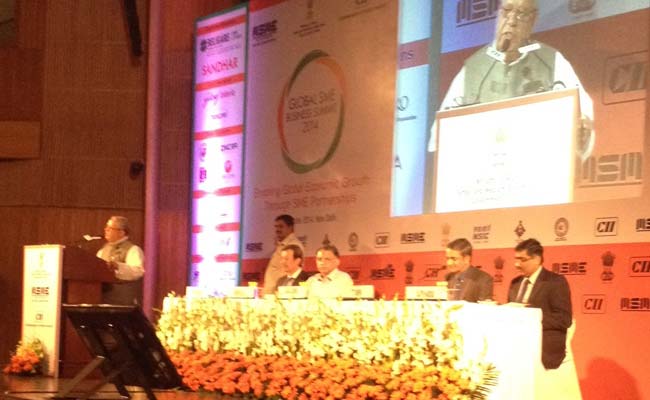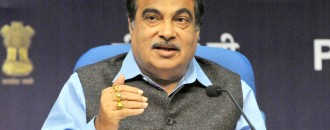
Reducing procedural barriers essential to improve India’s MSME sector, say Industry leaders
Neha Dewan | TheDollarBiz
 (L - R): Speaking at the event Mr. Kalraj Mishra, Minister for MSME, Government of India; Mr. Deep Kapuria, Chairman, CII Regional Committee on Central Europe; Mr. Madhav Lal, Secretary, Ministry MSME, Government of India; Mr. T.T. Ashok, Co-Chairman, CII National SME Council; Mr. Sujith Haridas, Deputy Director General, CII
(L - R): Speaking at the event Mr. Kalraj Mishra, Minister for MSME, Government of India; Mr. Deep Kapuria, Chairman, CII Regional Committee on Central Europe; Mr. Madhav Lal, Secretary, Ministry MSME, Government of India; Mr. T.T. Ashok, Co-Chairman, CII National SME Council; Mr. Sujith Haridas, Deputy Director General, CIIIndustry leaders from India and several other countries said in the Global SME Business Summit 2014 in New Delhi this week that the government should focus on simplifying procedures and on skill-upgradation to help improve the Micro, Small and Medium Enterprises (MSMEs) sector in India. The MSME sector plays a key role in India’s economy and in making the recently launched “Make in India” campaign a success. According to government estimates, MSMEs account for around 8% of India’s GDP, but for around 45% of the manufacturing output and 40% of the country’s exports. The sector is also the second largest source (after agriculture) of employment in India. In the Union Budget 2014-15, the government has announced several measures to support the MSME sector, including a Rs.10,000 crore fund to enable venture capital into MSMEs. However, much remains to be done to bridge gaps in competitiveness and use of technology in the sector. The Global SME Business Summit 2014, held by the Confederation of Indian Industry (CII) in partnership with the Ministry of Micro, Small and Medium Enterprises (MSME), aimed to remove bottlenecks in the growth of SMEs through global partnerships and identification of new markets. Speaking at the summit, Patricia Hewitt, Chair, UK India Business Council, emphasized on building a healthy India-UK SME partnership. She suggested that SMEs of both countries could expand their businesses in each other’s domain with improvement in networking, reduction of procedural barriers and assessment of competitive environment. Kalraj Mishra, Minister for MSME, Government of India, said that the financial prosperity of a nation hinges on the performance of MSMEs. “If you see all developed nations, most of them will show how MSMEs have played a major role in their development story. From a financial perspective, MSME and SMEs are like the backbone of the economy,” he said. Mishra added that the government is keen to attract FDI because it does not just mean “Foreign Direct Investment” but also “First Develop India” for the government. The summit held a special session on Prime Minister Narendra Modi’s “Zero Defect, Zero Effect” mantra, which focuses on making India a world class manufacturing destination. However, there is a dearth of skilled manpower to make this vision a reality, said Harbhajan Singh, Director General, National Productivity Council. Highlighting the need to modify the education structure in India, he said, “Unless we link education with internship, we may not be able to get that kind of employable, skilled workforce that will be an asset to us.” Representatives of several countries participated in the summit, including from UK, France, Singapore, Italy, Pakistan, France, Kenya and Rwanda. The summit also held sectoral sessions to help explore business opportunities for MSMEs in several sectors such as the Agro and Food Processing sector, and Defence and Aerospace sector. The country session on Japan highlighted the role of Japan Finance Corporation (JFC) to facilitate Japanese SME businesses, while a session on business opportunities for MSMEs in Korea discussed how competitiveness can be built via India-Korea SME partnerships.
This article was published on October 10, 2014.






 to success.
to success.